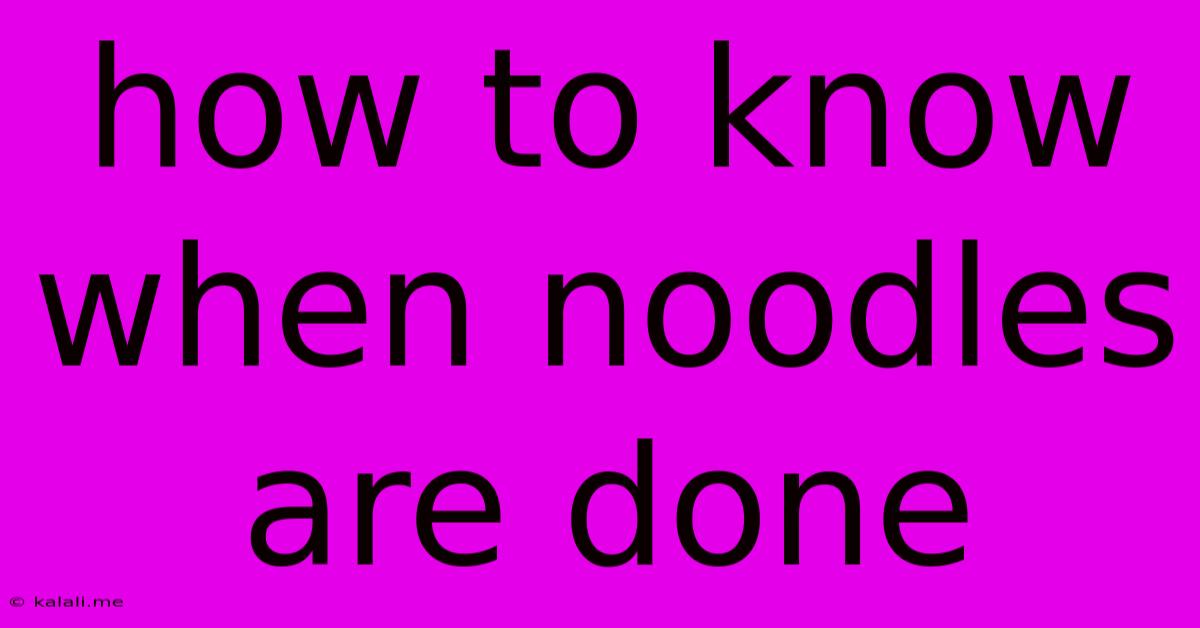How To Know When Noodles Are Done
Kalali
Jun 04, 2025 · 3 min read

Table of Contents
How to Know When Your Noodles Are Perfectly Cooked: A Guide to Noodle Nirvana
Knowing when your noodles are perfectly cooked is a culinary skill that elevates any noodle dish from bland to brilliant. Overcooked noodles become mushy and unappetizing, while undercooked noodles are tough and unpleasant to eat. This guide will teach you how to achieve noodle perfection, regardless of the type of noodle you're using. Mastering this simple technique will transform your noodle game!
Understanding Different Noodle Types
The cooking time for noodles varies greatly depending on their type and thickness. Fresh noodles generally cook much faster than dried noodles. Thick noodles require longer cooking times than thin noodles. Always check the package instructions for specific cooking times, but these instructions often serve as a starting point rather than a definitive answer. Factors like the amount of water and the heat level can also influence cooking time.
Methods for Checking Noodle Doneness
There are several reliable ways to determine if your noodles are cooked to perfection:
-
The Package Instructions (The Baseline): Always start by checking the package instructions. These are a helpful guideline, but remember they are often a general suggestion, not a hard and fast rule.
-
The Bite Test: The most reliable method is the bite test. After the recommended cooking time has almost elapsed, remove a small portion of noodles and bite into it. Perfectly cooked noodles should be tender but still have a slight firmness to the bite; they shouldn't be mushy or gummy. If they are still too firm, cook for a little longer and test again.
-
The Visual Cue (for some noodle types): Some noodles, especially fresh egg noodles, will become translucent when cooked through. This visual cue can be helpful but is not always reliable for all noodle types.
-
The Feel Test: As you cook the noodles, notice how they feel. Initially, they'll feel firm and almost rigid. As they cook, they will gradually become softer. This change in texture is another helpful indicator of doneness.
Troubleshooting Common Noodle Cooking Problems:
-
Mushy Noodles: This indicates overcooking. Next time, reduce the cooking time slightly or use a lower heat. Don't leave the noodles in the hot water once they are cooked – drain them immediately.
-
Hard Noodles: This means undercooking. Increase the cooking time slightly and check again. Make sure the water is at a rolling boil before adding the noodles.
-
Sticking Noodles: To prevent noodles from sticking together, add them to a large pot of boiling water, stir gently after adding them, and avoid overcrowding the pot. You can also add a tablespoon of oil to the water to help prevent sticking.
Noodle Cooking Tips for Success:
-
Use Plenty of Water: Using a large pot with plenty of water ensures even cooking and prevents the noodles from sticking together.
-
Salt the Water: Adding salt to the boiling water seasons the noodles from the inside out, enhancing their flavor.
-
Don't Rinse (Unless Specified): Rinsing your noodles after cooking removes some of the starch, which can impact the sauce's ability to cling to them. Unless a recipe specifically calls for rinsing, skip this step.
-
Experiment: Don't be afraid to experiment with different cooking times to find what works best for your preferred level of doneness and your specific noodle type.
By following these tips and paying attention to the texture and appearance of your noodles, you'll be able to master the art of cooking perfect noodles every single time, leading to consistently delicious and satisfying meals. Happy cooking!
Latest Posts
Latest Posts
-
How Do I Know If I Have Perfect Pitch
Jun 06, 2025
-
Can I Replace Only One Tire
Jun 06, 2025
-
Danger Of Using Ground As Neutral
Jun 06, 2025
-
How To Change Sens On Minercraft
Jun 06, 2025
-
How To Fix Screw Holes In Wood
Jun 06, 2025
Related Post
Thank you for visiting our website which covers about How To Know When Noodles Are Done . We hope the information provided has been useful to you. Feel free to contact us if you have any questions or need further assistance. See you next time and don't miss to bookmark.